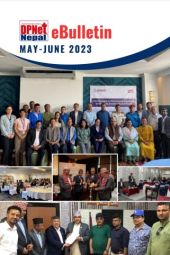May-June 2023 DPNet eBulletin
Summary
This bulletin summary encapsulates DPNet’s diverse activities and collaborative efforts in DRR and climate resilience in Nepal, spanning May to June 2023. The period was marked by several key initiatives, dialogues, and workshops aimed at enhancing the nation’s preparedness and response to disasters, fostering partnerships, and driving policy dialogue towards resilient community development. One of the significant events was a policy dialogue on Psychosocial Counselling Services for disaster-affected individuals, emphasizing the integration of mental health support in disaster management stages. This discussion highlighted the crucial role of psychosocial support in enhancing the well-being and recovery of affected communities.
Another critical dialogue focused on the effectiveness of Early Warning Systems (EWS) in disaster risk reduction and management, advocating for a comprehensive multi-hazard approach and the development of earthquake early warnings. This discussion underscored the need for technological advancements and policy formulation to bolster Nepal’s early warning capabilities. The unveiling of the Resilience Assessment and Adaptation for Critical Infrastructure tool, a collaborative effort between WFP and DPNet, marked a technological aspect in disaster response, aiming to improve emergency logistics and response efficiency by addressing road accessibility challenges during disasters. A workshop on the Grand Bargain and the establishment of a National Reference Group (NRG) underscored the imperative of enhancing the effectiveness and efficiency of humanitarian aid through improved transparency, community involvement, and the empowerment of local actors. This event highlighted the need for a collective approach and the inclusion of women and marginalized groups in humanitarian actions.
DPNet also facilitated a discussion on the role of the private sector in DRR, recognizing the significance of leveraging private resources and expertise in building resilient communities. This dialogue emphasized the economic rationale behind preparedness investments and advocated for strategic partnerships across sectors. The agreement among local governments in the Doda Watershed to collaborate on disaster risk mitigation initiatives represented a commitment to sustainable development and climate change adaptation at the local level. This collective effort aims to strengthen climate and disaster resilience in the watershed area.
The Second National Conference on Disaster Risk Reduction provided a platform for stakeholders to discuss the midterm review phase of the Sendai Framework for DRR, sharing insights and strategies to enhance Nepal’s disaster resilience. This conference served as a crucial step in aligning national efforts with global DRR goals. These diverse initiatives and discussions reflect DPNet’s commitment to advancing disaster preparedness, risk reduction, and climate resilience in Nepal. Through collaborative efforts, technological innovation, policy dialogue, and community engagement, DPNet continues to play a pivotal role in building a safer, more resilient Nepal, addressing both current challenges and future risks.
Categories:
DPNet Publication
Sub-Categories:
Ebulletin
Published Year:
2024
